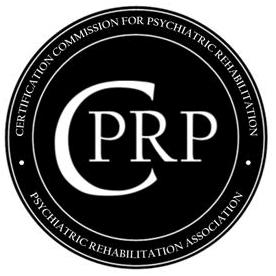You are here
 Today a growing number of academic institutions are offering classes, and in some cases degrees in psychiatric rehabilitation (PsyR). As the field matures and becomes more widely recognized by academic institutions, the in-service training needs of current staff members have also increased. With this increased focus on education and training, questions about what to include in the curriculum become important. The content and structure of the Certified Psychiatric Rehabilitation Practitioner (CPRP) designation examination can inform decisions about the curricula of PsyR education and training. The intensive and on-going effort to maintain the validity of the CPRP examination provides a blueprint for designing PsyR curricula for academic institutions and training programs.
Today a growing number of academic institutions are offering classes, and in some cases degrees in psychiatric rehabilitation (PsyR). As the field matures and becomes more widely recognized by academic institutions, the in-service training needs of current staff members have also increased. With this increased focus on education and training, questions about what to include in the curriculum become important. The content and structure of the Certified Psychiatric Rehabilitation Practitioner (CPRP) designation examination can inform decisions about the curricula of PsyR education and training. The intensive and on-going effort to maintain the validity of the CPRP examination provides a blueprint for designing PsyR curricula for academic institutions and training programs.
Over the years it has become increasingly clear that providers with PsyR knowledge, skills, attitudes, and values tend to provide the most effective and efficient services for persons with mental illnesses and psychiatric disabilities. The continued expansion of the PsyR knowledge base, which helps to define the profession, is a primary cause of this effect. The CPRP credential is the concrete manifestation of this development. Based on this knowledge base and updated by periodic job task analyses, this test based certification establishes the professional standards for the field. The CPRP represents the most up-to-date, widespread understanding of basic PsyR practice. In our fast changing field the continued reassessment of what it means to be a PsyR professional is vitally important. For example, major changes such as the emergence of a philosophy of Recovery and Wellness and the advent of Evidence-Based Practices are relatively new developments that have impacted our professional role and practice.
Updating curricula is an ongoing challenge for educators and trainers. Correctly answering questions such as, “What should be included and excluded?” and “How much time should different topics be afforded?” are critical for success. In that respect, consider this:
CPRP Commissioners and Psychiatric Rehabilitation Association staff spent hundreds of hours developing the 2012 CPRP Job Task Analysis Survey sent to over 10,000 psychiatric rehabilitation professionals and then our psychometric consultants analyzed it. In addition, a good portion of the job task analysis work was carried out by psychiatric rehabilitation professionals who volunteered their time.
Given this effort, the CPRP examination blueprint is a valid guide for what teaching and training curricula should cover. While no teaching or training effort would cover all the material covered by the examination, the emphasis on specific domains and their content provide excellent guidelines to follow. As an added bonus, the students and staff who participate in these trainings master the material they need for the CPRP examination and their professional certifications.
At the same time, with rapid change, there is a large time lag between the development of effective practices and their adoption by the field (e.g., Balas & Boren, 2000). While there are many reasons for this lag time, failure to keep teaching and training curriculum current should not be one of them. For example, today’s teaching and training curricula should foster an in-depth understanding of recovery and an emphasis on the importance of all aspects of wellness (Swarbrick, 2012). With the advent of evidence-based practices, the addition of techniques such as motivational interviewing and cognitive behavioral therapy, among others, should be emphasized at both the didactic and experiential levels.
Our field is obligated to develop and maintain effective professional PsyR practitioners. The CPRP is a manifestation of this obligation. Each of these activities of formal and continuing education supports the PRA mission to grow and train the recovery workforce.
Sources:
Balas, E. A. , & Boren, S. A. (2000). Managing clinical knowledge for health care improvement. In Yearbook of Medical Informatics. Edited by Bemmel J, McCray AT. Stuttgart: Schattauer Verlagsgesellschaft; 65-70.
Swarbrick, M. (2012). A wellness approach to mental health recovery. In Recovery of People with Mental Illness: Philosophical and Related Perspectives. Abraham Rudnick (ed). Oxford Press.



